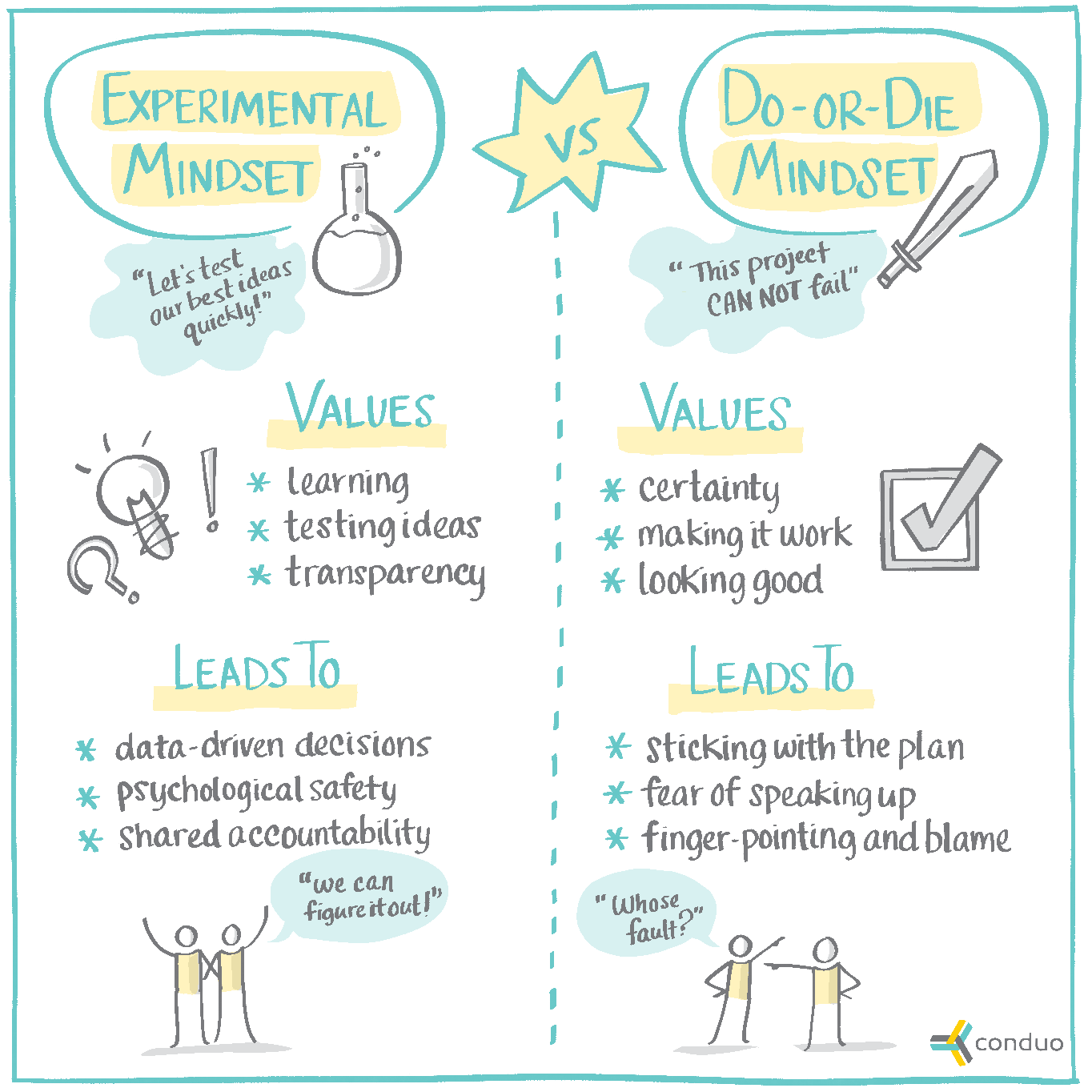The Value of an Experimental Mindset

By Julie Springer
April 14, 2022
Have you ever been in the position where you are told, “This has to work. We have made promises to (insert powerful stakeholder here) and we have to make it happen.”? You have doubts that it’s the right solution or that it’s possible in the given timeframe, but the pressure is on so you start working to get it done.
I’ve been there and I know it’s stressful to deliver your project under so much pressure and very frustrating when your concerns are not heard.
The Myth of Certainty
When you are in a high-pressure situation, certainty feels very important. You want to know that you can get the job done and meet the goal. The problem is that this can create or harden a “Do-or-Die” Mindset and culture, where mistakes are not tolerated and team members do not feel safe to raise concerns or deviate from the plan.
Most of us work in highly uncertain environments. There are many unknowns and things are always changing. We don’t have control over politics, the market or economy, changes in technology, what our stakeholders will do or the choices our customers will make.
There is no way to be 100% certain that your project will succeed. That’s why developing an Experimental Mindset in your organization is so important. With an Experimental Mindset, your approach to understanding and solving problems is valued over your ability to chart the course and stick with the plan. Your chances of success increase greatly as you validate your assumptions, test your ideas and make adjustments based on data.
7 Steps to Apply an Experimental Mindset on Your Project
Here’s how you approach the work when applying an Experimental Mindset:
- Gather data to understand the problem, context and customer needs
- Identify the goal and define measurable outcomes
- Brainstorm and analyze solution options
- Choose a solution that you believe will best achieve the outcome
- Break the larger solution into smaller pieces to test and deliver value along the way
- Run a series of experiments to learn, gather data and validate the solution
- Make adjustments based on what you learn
The value of the Experimental Mindset goes beyond improving results for your projects and initiatives, it creates a healthy work environment and happier teams. When learning is valued over being right, people know that it is ok to share their ideas and raise concerns. Teams have increased psychological safety, take ownership and hold themselves accountable to results.
Changing the Culture to Embrace Learning
The challenge is that some organizations - especially in traditional and risk-averse industries - have a culture where teams are not comfortable with defining the work as experiments. As a coach, I hear things like:
- The word experiment is not going to fly in this environment
- We’ve been told exactly what to do and now we just have to deliver
- We can’t try things because there is no room for error
In this case, it is especially important for leaders to understand what it means to take an Experimental Mindset and start to create a language and culture around learning. If they don’t, then people won’t feel safe to share risks or change the plan, even if they can see it is going off-track. This leads to blame and finger-pointing, decreased transparency and an incentive to hide mistakes and problems.
How to Get Started
For an organization that has been running with the Do-or-Die Mindset for years, it takes time and persistence to make the change. A good way to get started is to change the words you are using. This change needs to start with leadership. For example, leaders can say:
- “Here is the problem that we need to solve” instead of “This is what we need to do”
- “What options are you considering?” instead of “What solution did you pick?”
- “What is your hypothesis?” instead of “How do you know that is going to work?”
- “What can we learn from this?” instead of “How did this go wrong?”
Changing the language is a good start, but actions speak much louder than words. Leaders must provide time and space for teams to understand the problem and consider options. They must be supportive of teams delivering a portion of the solution to validate results along the way. When teams try something and it doesn’t work, leaders must address it as a learning moment and avoid assigning blame. This will start to create trust and an environment where an Experimental Mindset is possible and you can get much better results from your projects.

Our experienced coaches can help you develop a strategy and apply proven techniques to create an Experimental Mindset in your organization. Click here to set up a free call to get started.


